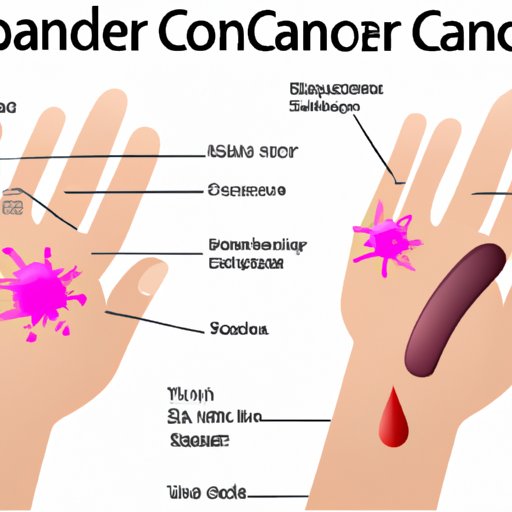
Introduction
Blood cancer can be a life-threatening disease that can affect anyone, regardless of gender or age. The disease affects the blood, bone marrow, and lymphatic system, causing abnormal growth of cells that can impair the immune system, leading to infections and other health complications. Understanding the symptoms of blood cancer is essential to early diagnosis and effective treatment.
That said, it’s important to note that blood cancer symptoms vary depending on the type of blood cancer. In this article, we will explore the common symptoms that could indicate you have blood cancer, which can help you and your doctor detect the disease early.
10 Warning Signs of Blood Cancer You Should Know
Blood cancer can manifest itself through various symptoms, including:
- Fever or chills
- Fatigue or weakness
- Night sweats
- Unexplained weight loss
- Loss of appetite
- Swelling in lymph nodes, liver, or spleen
- Prolonged bleeding or bruising
- Persistent infections
- Bone pain
- Shortness of breath
Fever or Chills
One of the most common symptoms of blood cancer is a persistent fever or chills that do not go away. This is often a sign that your body is fighting an infection, but it could also indicate blood cancer.
Fatigue or Weakness
Another common symptom is weakness or fatigue. You may feel tired, run-down, or like you have no energy. This is because blood cancer cells can interfere with the production of red blood cells, leading to anemia and fatigue.
Night Sweats
People with blood cancer may experience night sweats, which are severe sweating episodes that can soak through clothing and bedding. This symptom is often accompanied by fever and chills.
Unexplained Weight Loss
If you suddenly lose weight without trying, you should talk to your doctor. Unexplained weight loss can be a sign of many different health conditions, including blood cancer.
Loss of Appetite
Blood cancer can cause a loss of appetite, making it difficult to eat and get the necessary nutrients your body needs to function properly. This, in turn, can lead to further weight loss and weakness.
Swelling in Lymph Nodes, Liver, or Spleen
Blood cancer can cause swelling in lymph nodes, liver, or spleen. This happens because blood cancer cells can collect in these areas, leading to swelling and discomfort.
Prolonged Bleeding or Bruising
If you find yourself bruising easily or bleeding for an extended period, it could be a sign of blood cancer. This is because blood cancer cells can interfere with normal blood clotting and cause excessive bleeding or clotting.
Persistent Infections
If you continually have infections, it could be because your immune system is not functioning properly due to blood cancer.
Bone Pain
If you have been experiencing bone pain that gets worse over time, you should talk to your doctor as bone pain can be a sign of blood cancer. Blood cancer cells can accumulate in bone marrow, leading to bone pain.
Shortness of Breath
If you feel short of breath, it could be a sign that you have blood cancer. Blood cancers that affect the bone marrow can also limit the production of blood cells, leading to a reduced oxygen supply.
Detecting Blood Cancer: Common Symptoms to Look Out For
While anyone can develop blood cancer, some factors can increase your risk of developing it, including family history, exposure to radiation, chemotherapy, and infection with certain viruses such as HIV and hepatitis B or C.
If you have any of the symptoms mentioned above, it doesn’t always mean you have blood cancer. However, if you are exhibiting any of these symptoms, it’s important to get evaluated by your doctor.
Understanding Blood Cancer Symptoms: What You Need to Know
As mentioned earlier, symptoms of blood cancer can vary, and some people may not exhibit any symptoms until the later stages of the disease. For this reason, it’s essential to monitor your body and talk to your doctor if you have any concerns.
Importance of Monitoring Your Body
Monitoring your body regularly can help you detect any changes that might indicate blood cancer. By doing so, you can ensure an early diagnosis, which can increase your chances of effective treatment and recovery.
Detailed Explanation of Each Symptom
Blood cancer symptoms can be challenging to detect, but it’s important to look out for a combination of the above symptoms to avoid late diagnosis. Early detection can lead to better outcomes in the long run.

The Secret Symptoms of Blood Cancer Revealed
There are some less common symptoms that could indicate blood cancer. These symptoms include:
- Headaches
- Blurred vision
- Confusion or memory problems
- Hearing loss or ringing in the ears
- Mouth sores
Headaches
If you experience persistent headaches that do not go away, you should talk to your doctor. Headaches could indicate pressure from cancerous cells on the brain.
Blurred Vision
Blurred vision is not only a sign of eye problems but could also indicate cancerous cells in the eyes. The cancerous cells can lead to blurry, double vision, or even partial or total loss of sight.
Confusion or Memory Problems
People experiencing confusion or memory problems should get evaluated by their doctor. Confusion can be a sign of impaired brain function caused by cancerous cells.
Hearing Loss or Ringing in the Ears
People experiencing hearing loss or ringing in the ears, even after treating ear infections, should speak to their doctor. The symptoms could be an indicator of blood cancer.
Mouth Sores
Mouth sores are another less common symptom of blood cancer. If you have persistent mouth sores, you should talk to your doctor as blood cancer cells could be present in your mouth.
Blood Cancer: How to Recognize the Signs and Symptoms
Blood cancer can be difficult to diagnose early on, but there are ways to recognize the signs early, which can lead to effective treatment.
Tips on How to Recognize the Signs and Symptoms
If you have a family history of blood cancer or are experiencing any of the symptoms mentioned in this article, you should talk to your doctor. Also, if you have been treated for other health conditions such as radiation therapy or chemotherapy, you should get evaluated regularly to avoid late diagnosis.
Importance of Recognizing Symptoms Early
The earlier you receive a diagnosis for blood cancer, the better your chances of successful treatment. That’s why it’s essential to recognize the signs and symptoms of blood cancer early in the disease’s progression.
Blood Cancer Symptoms: What Your Body Could Be Telling You
If you are experiencing any of the above symptoms, you should talk to your doctor. While they may not necessarily indicate blood cancer, it’s essential to get a proper diagnosis to ensure your health and well-being.
Importance of Paying Attention to Your Body’s Signals
Your body is signaling that something is not right when it’s exhibiting symptoms. If you ignore your body’s signals, you could allow blood cancer to progress, leading to less favorable outcomes.
Explanation of Each Symptom
We have discussed all the common and less common symptoms that could indicate blood cancer in this article. Talk to your doctor if you experience any of these symptoms.
The Telltale Signs of Blood Cancer: Spotting the Symptoms Early
If you are experiencing any of the symptoms we’ve discussed, it’s essential to get evaluated early. Quick evaluation can lead to an accurate diagnosis, effective treatment, and better outcomes in the long run.
Importance of Early Detection
The earlier you detect blood cancer, the better your chances of treatment and cure. By seeking prompt medical attention, you could potentially save your life.
Summary of Key Symptoms to Watch Out For
The key symptoms of blood cancer include fever or chills, fatigue or weakness, night sweats, unexplained weight loss, loss of appetite, swelling in lymph nodes, liver or spleen, prolonged bleeding or bruising, persistent infections, bone pain, and shortness of breath. Any of these symptoms could indicate blood cancer.
Conclusion
Blood cancer is a severe illness that requires prompt medical attention. Understanding the symptoms of blood cancer and monitoring your body for changes could lead to an early diagnosis, effective treatment, and better chances of recovery. If you are experiencing any of the symptoms mentioned in this article, talk to your doctor today.





